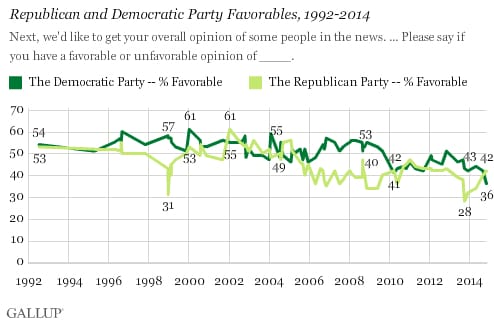Gallup Poll Shows Both Major Parties Remain Unpopular in U.S.

On Wednesday, Gallup published a survey that shows the Democratic Party's favorability dropping 6 percentage points in just the last week. The report reveals that this is a record low for the Democrats and that the Republican Party's favorability "remains steady at 42%."
Arguably the most notable trend, however, is the fact while one party's favorability has dropped, neither party is making significant gains with the American people -- something Gallup mentions briefly in its report.
"Neither party can say it is making significant progress in improving its image among the U.S. population, but undoubtedly the 2014 elections augmented the GOP's ability to shape the agenda in Washington and in state capitals across the country," Gallup's Andrew Dugan writes.

In fact, the last time either party polled over 50 percent was in December 2012, when the Democrats' favorability was at 51 percent while the Republican Party was at 43 percent. Whether one puts much stock in these types of public opinion polls or not, a correlation can be drawn between low party favorability and the dismal national voter turnout in the 2014 midterm elections.
People don't want to vote for candidates of parties they don't like, but in most cases it is the only option that is offered to them. Until the electoral system is reformed in most states, change is not likely to come -- both in terms of elections and the hyper-partisan environment on Capitol Hill. This may have created a feeling of apathy for some, but a better word to describe most voters is 'disenchantment.'
Republican commentators and consultants can rejoice at the findings of this poll and go on Fox News or another cable news station and say this is evidence that Americans are rejecting the policies of the Democratic Party. The truth is, however, that the American people are not rejecting policies as much as they are a lack of adequate representation from politicians in both major parties.
Photo Credit: Mykhaylo Palinchak / shutterstock.com


